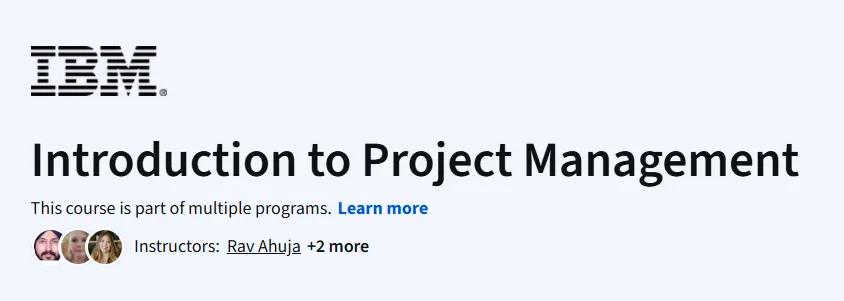What will you learn in Introduction to Project Management Course
Understand the core principles of project management.
Learn how to initiate, plan, execute, and close projects successfully.
Identify the roles and responsibilities of project managers and teams.
Gain insight into risk management, communication, and stakeholder engagement.
Program Overview
Module 1: What is Project Management?
⏱️ 1 week
Topics: Definition of a project, project vs operations, life cycle stages
Hands-on: Classify different types of work as projects or operations
Module 2: Project Initiation
⏱️ 1 week
Topics: Business case, project charter, stakeholder identification
Hands-on: Draft a basic project charter and stakeholder list
Module 3: Project Planning
⏱️ 1 week
Topics: Work breakdown structure, schedules, budgeting, communication plan
Hands-on: Create a simple WBS and develop a project timeline
Module 4: Project Execution and Closure
⏱️ 1 week
Topics: Monitoring progress, managing change, closing processes
Hands-on: Review project performance data and prepare a project close-out report
Get certificate
Job Outlook
Project management is a high-growth skill across industries like IT, construction, healthcare, and business.
Entry-level roles include Project Coordinator, Junior Project Manager, and Administrative PM Assistant.
Salaries typically range from $55,000 to $110,000 annually with experience.
PM skills also support freelance and consulting opportunities, especially for organized, process-oriented professionals.
Specification: Introduction to Project Management
|
FAQs
- No prior experience is required; the course introduces foundational project management concepts.
- Basic understanding of workplace tasks and team workflows is helpful but not mandatory.
- Step-by-step examples illustrate project planning, execution, and monitoring.
- The course is suitable for students, professionals, and career changers alike.
- Learners build knowledge applicable to both personal and professional projects.
- The course covers planning, scheduling, risk management, and resource allocation.
- Learners practice creating project timelines, task lists, and budgets.
- Exercises simulate real-world project scenarios to develop problem-solving skills.
- Guidance on communication and stakeholder management is included.
- Skills gained can be directly applied to small to medium-sized projects.
- Learners understand roles and responsibilities in project teams.
- Techniques for coordinating tasks and communicating effectively are taught.
- Emphasis on collaboration helps manage conflicts and align team goals.
- Skills support work in remote or cross-functional teams.
- Knowledge gained improves efficiency and team productivity in professional settings.
- Project management is a transferable skill applicable across industries.
- Understanding methodology improves employability in roles that require coordination and planning.
- Skills gained complement technical and managerial abilities.
- Knowledge of best practices helps in leadership and supervisory positions.
- Completing the course demonstrates readiness to manage projects effectively.
- Estimated completion is around 2–4 weeks at a part-time pace.
- Weekly effort of 2–4 hours is generally sufficient to follow lectures and complete exercises.
- Regular engagement ensures understanding of project management principles.
- Reviewing case studies or practicing project planning may require extra time.
- Consistent practice helps learners apply concepts effectively in real-world scenarios.





